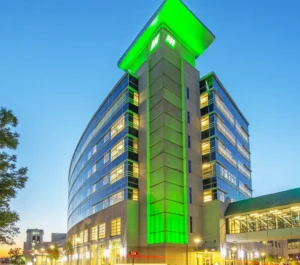Donald Trump, first lady positive for virus; he has ‘mild symptoms’
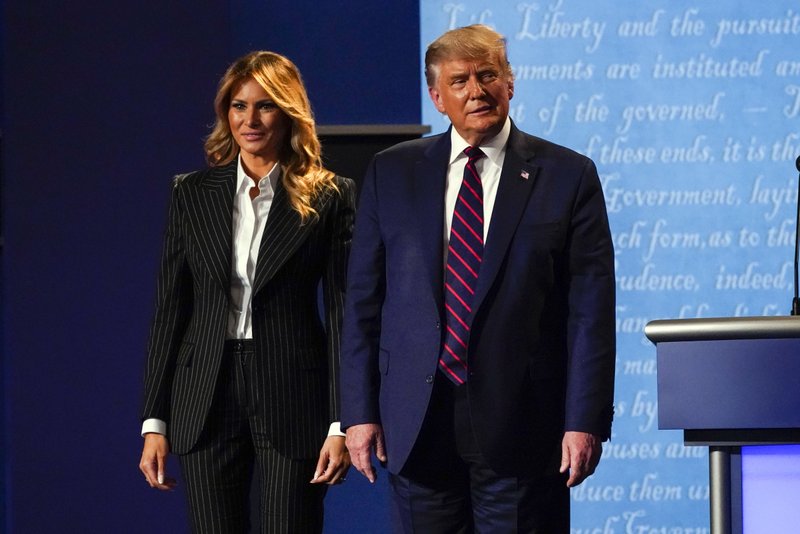
The White House physician said the president was expected to continue carrying out his duties “without disruption” while recovering.
Bradley Byrne: A new Supreme Court Justice
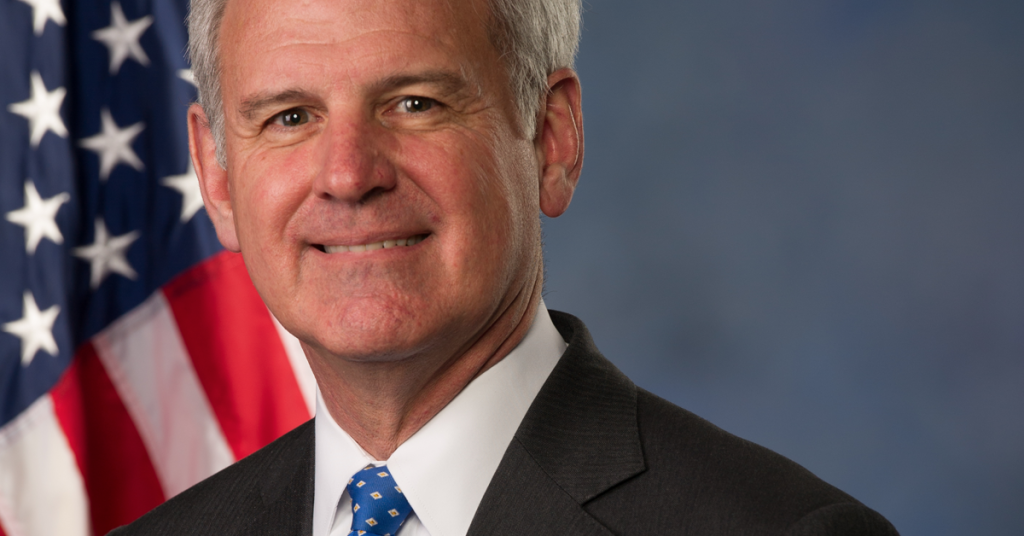
Bradley Byrne outlines his reasons for supporting President Trump’s nomination of Amy Coney Barrett.
Donald Trump picks conservative Amy Coney Barrett for Supreme Court
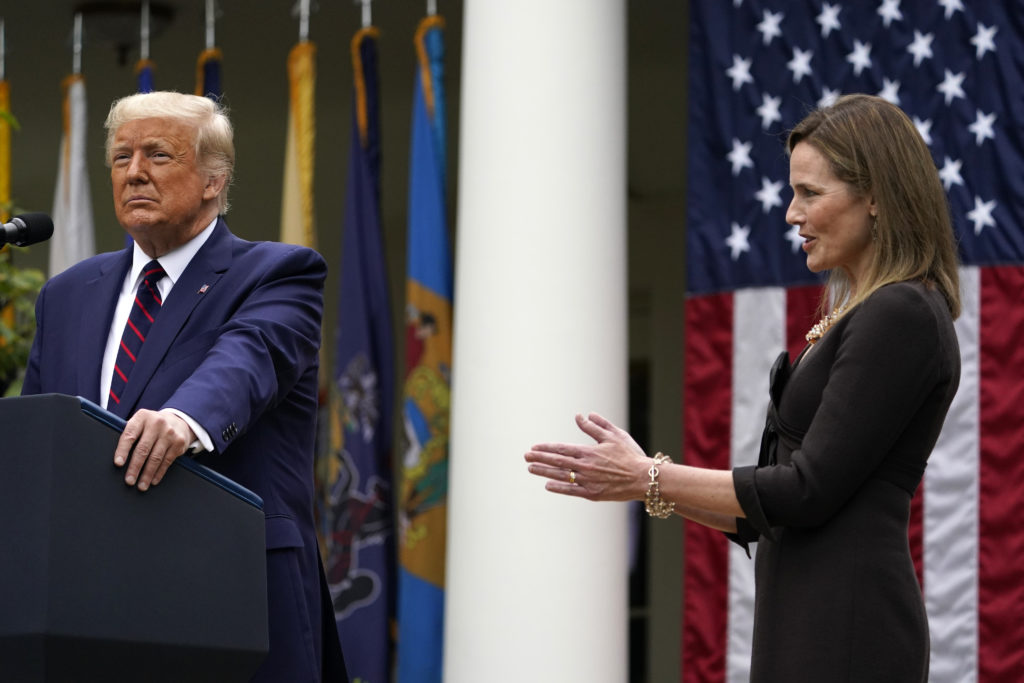
President Donald Trump nominated Judge Amy Coney Barrett to the Supreme Court on Saturday, capping a dramatic reshaping of the federal judiciary that will resonate for a generation and that he hopes will provide a needed boost to his reelection effort. Republican senators are already lining up for a swift confirmation of Barrett ahead of the Nov. 3 election, as they aim to lock in conservative gains in the federal judiciary before a potential transition of power. Trump, meanwhile, is hoping the nomination will serve to galvanize his supporters as he looks to fend off Democrat Joe Biden. Trump hailed Barrett as “a woman of remarkable intellect and character,” saying he had studied her record closely before making the pick. “I looked and I studied, and you are very eminently qualified,” he said as Barrett stood next to him in the Rose Garden. An ideological heir to the late conservative Justice Antonin Scalia, Barrett would fill the seat vacated after the Sept. 18 death of liberal icon Ruth Bader Ginsberg, in what would be the sharpest ideological swing since Clarence Thomas replaced Justice Thurgood Marshall nearly three decades ago. She would be the sixth justice on the nine-member court to be appointed by a Republican president, and the third of Trump’s first term in office. For Trump, whose 2016 victory hinged in large part on reluctant support from conservative and white evangelicals on the promise of filling Scalia’s seat with a conservative, the latest nomination in some ways brings his first term full circle. Even before Ginsburg’s death, Trump was running on having confirmed in excess of 200 federal judges, fulfilling a generational aim of conservative legal activists. “This is my third such nomination after Justice Neil Gorsuch and Justice Brett Kavanaugh, and it is a very proud moment indeed,” Trump said in the Rose Garden. Trump joked that the confirmation process ahead “should be easy” and “extremely non-controversial,” though it is likely to be anything. No court nominee has been considered so close to a presidential election before, with early voting already underway. He encouraged Democrats to take up her nomination swiftly and to “refrain from personal and partisan attacks.” In 2016, Republicans blocked President Barack Obama’s nomination of Merrick Garland to the Supreme Court to fill the election-year vacancy, saying voters should have a say in the lifetime appointment. Senate Republicans say they will move ahead, arguing the circumstances are different now that the White House and Senate are controlled by the same party. Senate Majority Leader Mitch McConnell said the Senate will vote “in the weeks ahead” on Barrett’s confirmation, adding that Trump “could not have made a better decision” in nominating the appellate court judge. The announcement came before Ginsburg was buried beside her husband next week at Arlington National Cemetery. On Friday, she was the first woman to lie in state at the Capitol, and mourners flocked to the Supreme Court for two days before that to pay respects. The set design, with large American flags hung between the Rose Garden colonnades, appeared to be modeled on the way the White House was decorated when President Bill Clinton named Ginsburg as his nominee in 1993. Barrett said she was “truly humbled” by the nomination, adding that she would be “mindful of who came before me.” She praised Ginsburg upon accepting the nomination, saying, “She has won the admiration of women across the country and indeed all across the world.” Within hours of Ginsburg’s death, Trump made clear he would nominate a woman for the seat, and later volunteered he was considering five candidates. But Barrett was the early favorite, and the only one to meet with Trump. Barrett has been a judge since 2017 when Trump nominated her to the Chicago-based 7th U.S. Circuit Court of Appeals. But as a longtime University of Notre Dame law professor, she had already established herself as a reliable conservative in the mold of Scalia, for whom she clerked in the late 1990s. She would be the only justice on the current court not to have received her law degree from an Ivy League school. The eight current justices all attended either Harvard or Yale. The staunch conservative had become known to Trump in large part after her bitter 2017 appeals court confirmation included allegations that Democrats were attacking her Catholic faith. The president also interviewed her in 2018 for the vacancy created by the retirement of Justice Anthony Kennedy, but Trump ultimately chose Brett Kavanaugh. Trump and his political allies are itching for another fight over Barrett’s faith, seeing it as a political windfall that would backfire on Democrats. Catholic voters in Pennsylvania, in particular, are viewed as a pivotal demographic in the swing state that Biden, also Catholic, is trying to recapture. While Democrats appear powerless to stop Barrett’s confirmation in the GOP-controlled Senate, they are seeking to use the process to weaken Trump’s reelection chances. Barrett’s nomination could become a reckoning over abortion, an issue that has divided many Americans so bitterly for almost half a century. The idea of overturning or gutting Roe v. Wade, the landmark 1973 decision that legalized abortion, has animated activists in both parties for decades. Now, with the seemingly decisive shift in the court’s ideological makeup, Democrats hope their voters will turn out in droves because of their frustration with the Barrett pick. Trump has also increasingly embraced the high court — which he will have had an outsize hand in reshaping -– as an insurance policy in a close election. Increases in mail, absentee, and early voting brought about by the coronavirus pandemic have already led to a flurry of election litigation, and both Trump and Biden have assembled armies of lawyers to continue the fight once vote-counting begins. Trump has been open about tying his push to name a third justice to the court to a potentially drawn-out court fight to determine who will be sworn in on Jan. 20, 2021. “I think this
Donald Trump interviews Amy Barrett while weighing a high court nominee
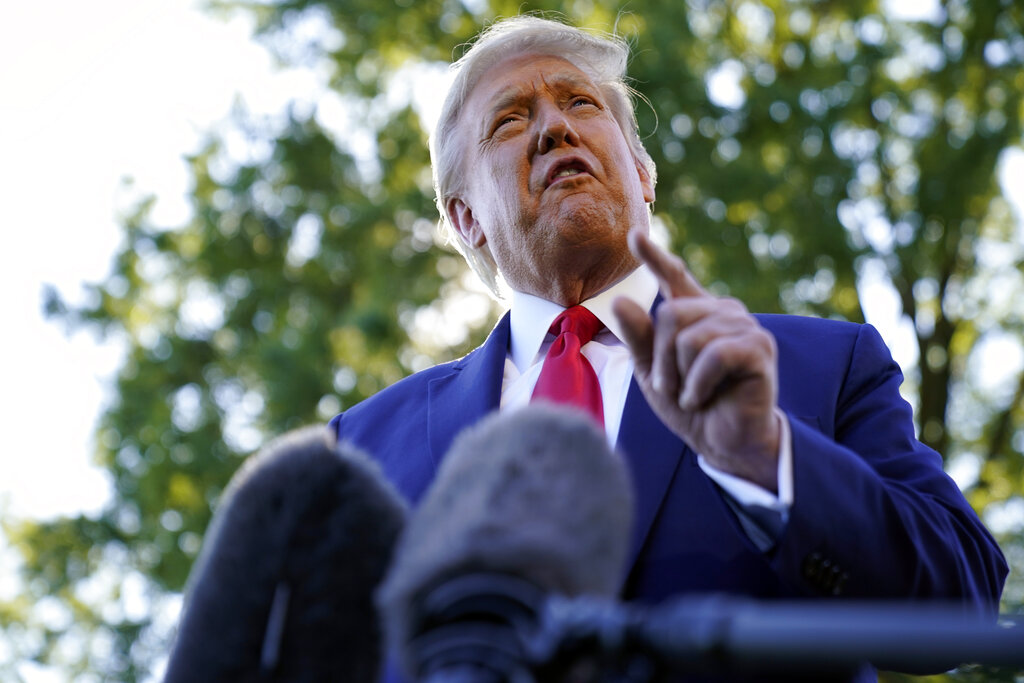
Trump said Monday he expects to announce his choice by week’s end, before the burial next week of Ginsburg.
Joe Biden to GOP senators: Don’t jam through Ruth Bader Ginsburg nominee
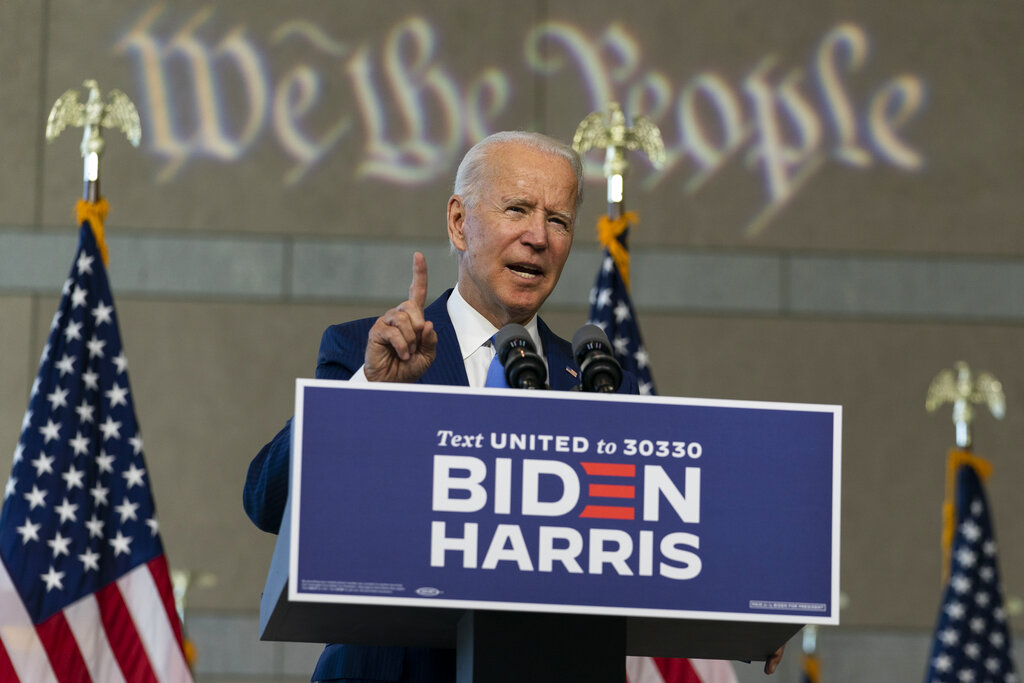
The extraordinary televised plea from the Democratic presidential candidate to Republican senators reflected the ferocious maneuvering that has followed Ginsburg’s death.
Donald Trump picks Brett Kavanaugh for court, setting up fight with Democrats

President Donald Trump chose Brett Kavanaugh, a solidly conservative, politically connected judge, for the Supreme Court Monday night, setting up a ferocious confirmation battle with Democrats as he seeks to shift the nation’s highest court ever further to the right. A favorite of the Republican legal establishment in Washington, Kavanaugh, 53, is a former law clerk for retiring Justice Anthony Kennedy. Like Trump’s first nominee last year, Justice Neil Gorsuch, Kavanaugh would be a young addition who could help remake the court for decades to come with rulings that could restrict abortion, expand gun rights and roll back key parts of Obamacare. “He is a brilliant jurist, with a clear and effective writing style, universally regarded as one of the finest and sharpest legal minds of our time,” Trump said in his prime-time televised White House announcement. He added: “There is no one in America more qualified for this position, and no one more deserving.” With Kavanaugh, Trump is replacing a swing vote on the nine-member court with a staunch conservative. Kavanaugh, who serves on the Court of Appeals for the D.C. Circuit, is expected to be less receptive to abortion and gay rights than Kennedy was. He also has taken an expansive view of executive power and has favored limits on investigating the president. Speaking at the White House, Kavanaugh pledged to preserve the Constitution and said that “a judge must be independent and must interpret the law, not make the law. A judge must interpret the Constitution as written.” A senior White House official said Trump made his final decision on the nomination Sunday evening, then phoned Kavanaugh to inform him. The official said Trump decided on Kavanaugh because of his large body of jurisprudence cited by other courts, describing him as a judge that other judges read. On Monday, Trump phoned retiring Justice Kennedy to inform him that his former law clerk would be nominated to fill his seat. Trump signed Kavanaugh’s nomination papers Monday evening in the White House residence. Top contenders had included federal appeals judges Raymond Kethledge, Amy Coney Barrett and Thomas Hardiman. Some conservatives have expressed concerns about Kavanaugh, questioning his commitment to social issues like abortion and noting his time serving under President George W. Bush as evidence he is a more establishment choice. But his supporters have cited his experience and wide range of legal opinions. With Democrats determined to vigorously oppose Trump’s choice, the Senate confirmation battle is expected to dominate the months leading up to November’s midterm elections. Senate Republicans hold only a 51-49 majority, leaving them hardly any margin if Democrats hold the line. Democratic senators running for re-election in states Trump carried in 2016 will face pressure to back his nominee. Senate Majority Leader Mitch McConnell called Kavanaugh “a superb choice” and said senators would start meeting with him this week. Some Republican senators had favored other options. Rand Paul of Kentucky had expressed concerns but tweeted that he looked forward to meeting with Kavanaugh “with an open mind.” Democrats and liberal advocacy groups quickly lined up in opposition. Signaling the fight ahead on abortion rights, Dawn Laguens, executive vice president of Planned Parenthood Federation of America, said in a statement: “There’s no way to sugarcoat it: With this nomination, the constitutional right to access safe, legal abortion in this country is on the line. The White House invited a number of senators to attend the Monday night announcement. Democrats who were invited but declined included Sens. Joe Donnelly of Indiana, Heidi Heitkamp of North Dakota, Doug Jones of Alabama, Joe Manchin of West Virginia and Dianne Feinstein of California. Feinstein is the ranking Democrat on the Judiciary Committee. The others are Republican targets for the confirmation vote who come from Trump-won states where they face re-election this fall. Democrats have turned their attention to pressuring two Republicans, Sens. Susan Collins of Maine and Lisa Murkowski of Alaska, to oppose any nominee who threatens Roe v. Wade. The two have supported access to abortion services. Kavanaugh is likely to be more conservative than Justice Kennedy on a range of social issues. At the top of that list is abortion. A more conservative majority could be more willing to uphold state restrictions on abortion, if not overturn the 45-year-old landmark Roe v. Wade decision that established a woman’s constitutional right. Kennedy’s replacement also could be more willing to allow states to carry out executions and could support undoing earlier court holdings in the areas of racial discrimination in housing and the workplace. Kennedy provided a decisive vote in 2015 on an important fair housing case. Like the other eight justices on the court, Kavanaugh has an Ivy League law degree, spending his undergraduate and law school years at Yale. Since 2006, he has been a judge on the federal appeals court in Washington. He also was a key aide to Kenneth Starr during Starr’s investigation of President Bill Clinton, worked on behalf of George W. Bush’s campaign during the election recount in 2000 and served in the Bush White House. Kavanaugh’s many written opinions provide insight into his thinking and also will be fodder for Senate Democrats who will seek to block his confirmation. He has written roughly 300 opinions as a judge, authored several law journal articles, regularly taught law school classes and spoken frequently in public. Kavanaugh’s views on presidential power and abortion are expected to draw particular attention in his confirmation hearing. Drawing on his experience working on the Clinton investigation and then in the Bush White House, he wrote in a 2009 law review article that he favored exempting presidents from facing both civil suits and criminal investigations, including indictment, while in office. That view has particular relevance as special counsel Robert Mueller is looking into Russian meddling in the 2016 election and whether the Trump campaign played any role in a foreign interference plot. On abortion, Kavanaugh voted in October to delay an abortion for a teenage immigrant who was in government
What to expect in the Supreme Court confirmation battle
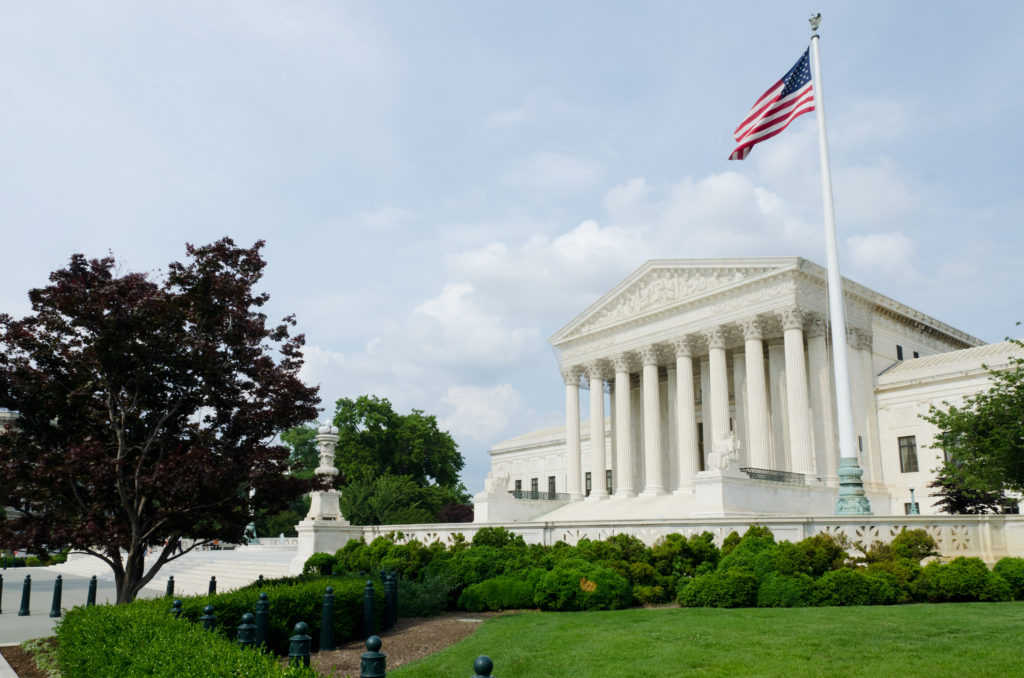
The coming battle over a Supreme Court nominee promises to be a bruising one. Republicans are eager for conservatives to gain a firm majority on the court. Democrats are voicing alarm about what the new justice could mean for charged issues such as abortion rights and gay rights. The stakes are enormous, and advocacy groups that don’t have to unveil their donors are spending heavily to shape the fight. President Donald Trump’s top contenders for the vacancy appear to be federal appeals judges Amy Coney Barrett, Thomas Hardiman, Brett Kavanaugh and Raymond Kethledge. Trump planned to announce his pick Monday night. Regardless of his choice, it’s likely that the closely divided Senate will be holding a momentous confirmation vote just weeks before the midterm election. A look at what to expect: Finding The Votes Republicans may have a narrower margin for error than they did when the Senate confirmed Trump’s first Supreme Court nominee, Neil Gorsuch, by a vote of 54-45 in April 2017. Democratic Sen. Doug Jones of Alabama has replaced Republican Sen. Luther Strange, cutting the GOP’s Senate majority to 51-49. Meanwhile, Republican Sen. John McCain of Arizona is battling brain cancer and has not been back to the Capitol since December. That increases the focus on two Republicans — Sen. Susan Collins of Maine and Lisa Murkowski of Alaska. Both support a woman’s right to have an abortion and will be looking for assurances that the nominee would not overturn the Roe v Wade decision establishing abortion rights. Trump pledged in 2016 that he would be “putting pro-life justices on the court.” On the Democratic side, the focus will be on Sens. Heidi Heitkamp of North Dakota, Joe Donnelly of Indiana and Joe Manchin of West Virginia. All three voted to confirm Gorsuch and are up for re-election in states that Trump won handily. Whatever they decide will upset a large group of voters in their home states. If Collins and Murkowski vote “no” and Democrats all vote “no,” the nomination would be blocked. If McCain were to miss the vote, only one GOP defection would be needed to block the nomination if all Democrats were opposed. Old Wounds Democrats are still stinging from Republicans refusing to even grant a hearing to President Barack Obama’s choice to serve on the Supreme Court, Merrick Garland. They are calling on Senate Majority Leader Mitch McConnell, R-Ky., to wait until after the November election to schedule a hearing and vote. McConnell has rejected that possibility, saying the decision to not fill the vacancy under Obama was prefaced on it being a presidential election year. Democrats say McConnell is being hypocritical in moving forward with the nomination. While that argument won’t sway Republicans, their strategy could stiffen Democratic resolve to oppose the nominee. Liberal advocacy groups are challenging Minority Leader Chuck Schumer, D-N.Y., to keep the Democrats united. Senate Relations Much of the groundwork for a successful confirmation comes in private meetings that the nominee will have with individual senators in the coming weeks. For lawmakers who are not on the Judiciary Committee, it may be their only chance to talk with the nominee personally before a final vote. Gorsuch met with nearly three-quarters of the Senate in advance of his hearings. The process is arduous, with the private meetings giving way to days of testimony before the Senate Judiciary Committee, which has 11 Republicans and 10 Democrats. Hearings for the most recent nominees to the Supreme Court have lasted four or five days, though there were 11 days of hearings for Robert Bork’s nomination in 1987. On average, for Supreme Court nominees who have received hearings, the hearing occurred 39 days after the nomination was formally submitted, according to the Congressional Research Service. The Judiciary Committee need not approve the nomination for it to advance. A negative recommendation or no recommendation merely alerts the Senate that a substantial number of committee members have reservations. The Fight Outside The Capitol Before the president has even made his announcement, advocacy groups are making clear they will play an important role in the coming fight. Groups that support abortion rights are planning a “Day of Action” for August 26, the anniversary of the 1920 adoption of the 19th Amendment giving women the right to vote. The liberal advocacy group Demand Justice will spend $5 million on ads through September and began airing spots Thursday in Maine and Alaska aimed at pressuring Collins and Murkowski. “Why won’t she rule out voting for Trump’s anti-choice picks?” both ads ask. It also plans to run ads next week in Manchin’s, Donnelly’s and Heitkamp’s home states with a softer tone, asking them to continue protecting people with pre-existing health conditions by opposing a nominee who’d threaten that. Meanwhile, the conservative Judicial Crisis Network is targeting vulnerable Democratic incumbents in its ad campaigns. The deep-pocketed group advertised against Senate confirmation of Garland and spent millions more advocating for Gorsuch. Republished with the permission of the Associated Press.
Doug Jones not opposed to confirming Donald Trump’s Supreme Court pick
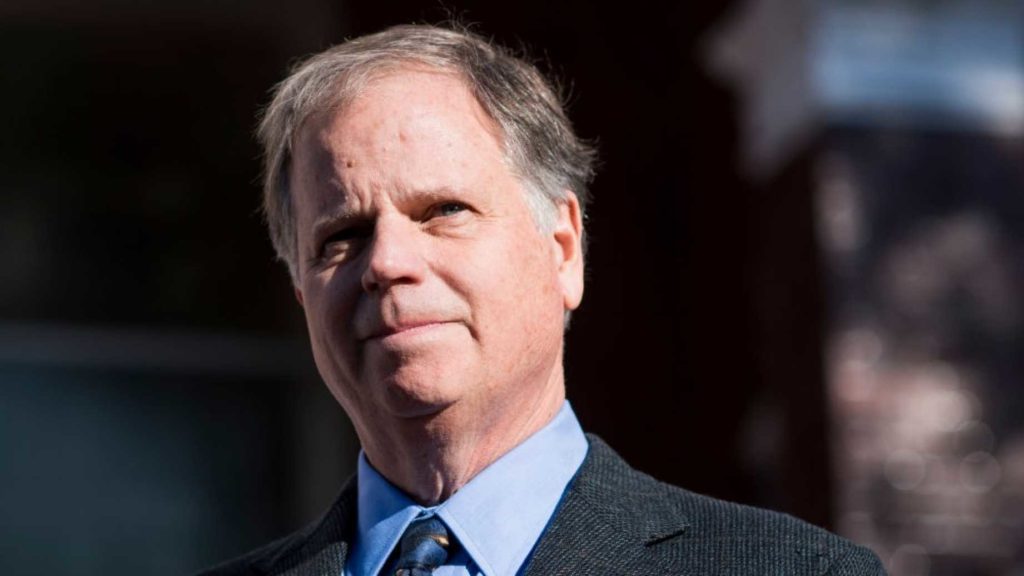
President Donald Trump is expected to announce his decision on who he will nominate to replace retiring Supreme Court Justice Anthony Kennedy in the Supreme Court Monday evening, and Alabama Senator Doug Jones has stated he is open to voting in favor of the new Justice. “I’m open to voting yes. I’m open to voting no. We don’t know who the nominee is going to be yet,” Jones told CNN on the State of the Union Sunday morning. “I don’t think my role is to rubber stamp for the President, but it’s also not an automatic knee-jerk no, either.” As of Monday morning, Trump’s top contenders for the vacant Justice seat are federal appeals judges Amy Coney Barrett, Thomas Hardiman, Brett Kavanaugh and Raymond Kethledge. Trump’s choice is predicted to begin a battle in the Senate between Democrats who are warning that the development may lead to changes on issues such as abortion rights and gay rights; and Republicans who are eager to win a majority in the court. “We’re going to give them a very, very good, hard and fair look to determine what I believe to be the best interest of my constituents, but also the country,” Jones continued. “I don’t think anyone should expect me to simply vote yes for this nominee, just simply because my state may be more conservative than others.” Jones beat out former Chief Justice Roy Moore in the December 2017 special election to fill the U.S. Senate seat previously occupied by Attorney General Jeff Sessions. Since then he’s caused a few controversies within the Alabama Legislature; to the point that the Alabama State Senate passed a resolution condemning his January vote against legislation banning late term abortions, but says he believes the rhetoric on both sides of the aisle isn’t helping. “I would prefer they don’t do that. I would prefer the Republicans would not say they automatically will vote for someone. The problems we have now is a partisan divide. This has become a political issue instead of an independent judiciary. That’s not a good thing,” Jones said during the interview according to AL.com.
Donald Trump weighs 2 or 3 candidates for court, to meet with Mike Pence
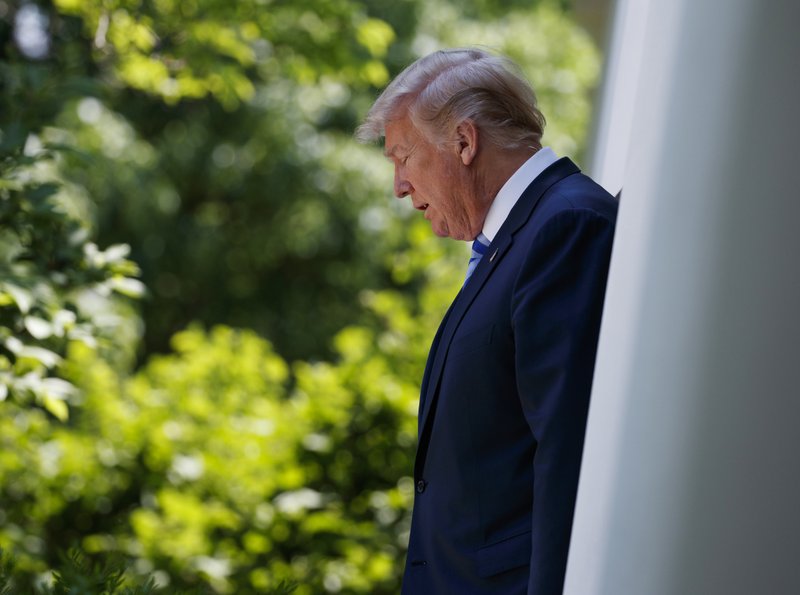
President Donald Trump is closing in on his choice to fill a Supreme Court vacancy created by Justice Anthony Kennedy’s retirement, telling reporters that he’s focused on two or three people ahead of his Monday announcement. “I think I have it down to four people. And I think of the four people I have it down to three or two,” Trump told reporters aboard Air Force One Thursday, as he traveled to a campaign rally in Montana. Trump was at his private golf club in New Jersey Friday and planned to spend the weekend there, consulting with advisers as he picks his court nominee amid intense jockeying from various factions seeking to influence the choice. The president planned to have dinner Friday night with Vice President Mike Pence, who has also been meeting with candidates as part of the vetting process. The president’s top contenders include federal appeals court judges Amy Coney Barrett, Brett Kavanaugh and Raymond Kethledge, with federal appeals court judge Thomas Hardiman still considered in the mix. As part of the roll-out process, the White House has been preparing information packages on all four, said two people familiar with the process who were not authorized to speak publicly. Starting from a list of 25 names vetted by conservative groups, Trump has also given serious consideration to federal appeals court judges Amul Thapar and Joan Larsen, and it’s possible the White House will prepare materials for more people. The president enjoyed the suspenseful process leading up to his announcement last year that he would nominate Justice Neil Gorsuch and is hoping to keep the guessing game going until he announces his pick Monday night. Trump’s social media director Dan Scavino tweeted Friday that the announcement would be at 9 p.m. from the East Room in the White House. Pence met in person with Kethledge and Barrett while he was vacationing in Indiana earlier this week and met with Kavanaugh at the Naval Observatory on July 4, said a person familiar with the process who was not authorized to speak publicly. Pence has also spoken to Republican senators, including Senate Majority Leader Mitch McConnell, Sen. Ted Cruz and Sen. Rand Paul about the process. As the president builds suspense for his second court pick in two years — a nominee who could tip the balance toward conservatives and revisit landmark rulings on abortion access, gay marriage and other issues — momentum is also growing among GOP supporters and detractors of the top contenders. Conservatives and some libertarian-leaning Republicans, including Paul of Kentucky, have raised concerns about Kavanaugh, warning he could disappoint Republicans if his past decisions are a guide. Paul and another Republican, Cruz of Texas, are supporting fellow Sen. Mike Lee, R-Utah, who is not said to be under serious consideration by the White House but is the only lawmaker Trump has considered for the position. To counter that, Kavanaugh’s allies have begun pushing back, reaching out to influential Republicans to ward off potential criticisms, according to one conservative who was the recipient of such outreach and spoke on condition of anonymity Thursday to discuss the situation. The senior administration official, though, said the administration is feeling less heat than earlier in this week over the choices, particularly Kavanaugh, and believes the jockeying in general has calmed somewhat. With the Senate narrowly divided, 51-49, in favor of Republicans, Trump’s announcement will launch a contentious confirmation process as Republicans seek to shift the court to the right and Democrats strive to block the effort. Any GOP defections could begin to doom a nominee. Senate Minority Leader Chuck Schumer, D-N.Y., told the president this week that nominating someone hostile to abortion access, or the 2010 health care law, would tarnish his legacy. Schumer told Trump that such a choice would be “cataclysmic” and create more division than the country has seen in years, according to a person familiar with the conversation who said Trump called Schumer on Tuesday. McConnell said Thursday at an event in Louisville he believes “the president will make a very high-quality appointment.” He acknowledged that his fellow Kentuckian, Judge Amul Thapar, is a finalist, but noted, “The competition at this level is pretty intense.” Trump conducted interviews Monday and Tuesday. Lee, R-Utah, is not viewed as a top prospect, but has consistent support among conservative and libertarian activists, including some Republicans who worry about a nominee not upholding their principles and who say the Utah senator could bring more certainty. Paul has told colleagues he may not vote for Kavanaugh if the judge is nominated, citing Kavanaugh’s role during President George W. Bush’s administration on cases involving executive privilege and the disclosure of documents to Congress, said a person familiar with Paul’s conversations who spoke on condition of anonymity. Some conservatives have pointed to Kethledge as a potential justice in the mold of Gorsuch. Both Kethledge and Gorsuch once served Kennedy as law clerks, as did Kavanaugh. Kethledge, a Michigan Law graduate, would add academic diversity to a court steeped in the Ivy League. Since Trump said his short list includes at least two women, speculation has focused on Barrett, a former law clerk to Justice Antonin Scalia and a longtime Notre Dame Law School professor who serves on the 7th U.S. Circuit Court of Appeals. Conservative groups rallied around Barrett after her confirmation hearing last year featured questioning from Democrats over how her Roman Catholic faith would affect her decisions. Trump’s choice to replace Kennedy — a swing vote on the nine-member court — has the potential to remake the court for a generation as part of precedent-shattering decisions. Recognizing the stakes, many Democrats have lined up in opposition to any Trump pick. Republished with the permission of the Associated Press.
Donald Trump closes in on Supreme Court pick; 3 judges top list
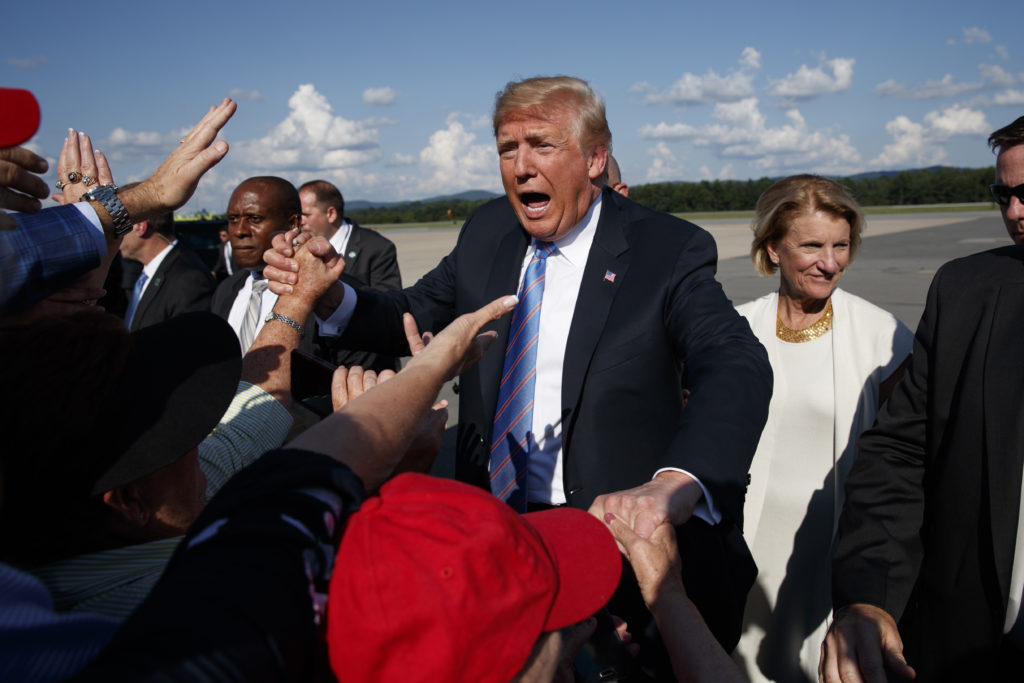
President Donald Trump is closing in on his next Supreme Court nominee, with three federal judges leading the competition to replace retiring Justice Anthony Kennedy. Trump’s top contenders for the vacancy at this time are federal appeals judges Amy Coney Barrett, Brett Kavanaugh and Raymond Kethledge, said a person familiar with Trump’s thinking who was not authorized to speak publicly. Working closely with a White House team and consulting with lawmakers and outside advisers, Trump has spent the week deliberating on the choice. He conducted interviews on Monday and Tuesday and has spoken to seven possible candidates. He has not yet publicly indicated that he has narrowed the list and could still consider others in the mix. With customary fanfare, Trump plans to announce his selection Monday night, kicking off a contentious nomination process as Republicans seek to shift the court to the right and Democrats strive to block the effort. Vice President Mike Pence has also met with some of the contenders for the Supreme Court vacancy created by Justice Anthony Kennedy’s retirement, The Associated Press has learned. The meetings took place in recent days, according to a person familiar with the search process. The person did not specify which candidates Pence met with and spoke on condition of anonymity Wednesday to describe the private search process. Trump is choosing his nominee from a list of 25 candidates vetted by conservative groups. Other contenders that have received serious interest include federal appeals judges Amul Thapar, Thomas Hardiman and Joan Larsen. The president spoke by phone with Republican Sen. Mike Lee of Utah on Monday. He’s the only lawmaker on Trump’s list. Trump’s choice to replace Kennedy — a swing vote on the nine-member court — has the potential to remake the court for a generation as part of precedent-shattering decisions on abortion, health care, gay marriage and other issues. Recognizing the stakes, many Democrats have lined up in opposition to any Trump pick, and Republican lawmakers and activists are seeking to shape the president’s decision. Sen. Rand Paul, R-Ky., has told colleagues he may not vote for Kavanaugh if the judge is nominated, citing Kavanaugh’s role during the Bush administration on cases involving executive privilege and the disclosure of documents to Congress, said a person familiar with Paul’s conversations who spoke to the AP on condition of anonymity. Some conservatives have pointed to Kethledge as a potential justice in the mold of Neil Gorsuch, Trump’s first Supreme Court nominee last year. Both Kethledge and Gorsuch once served Kennedy as law clerks, as did Kavanaugh. Kethledge, a Michigan Law graduate, would add academic diversity to a court steeped in the Ivy League. Since Trump said his short list includes at least two women, speculation has focused on Barrett, a former law clerk to Justice Antonin Scalia and a longtime Notre Dame Law School professor who serves on the 7th U.S. Circuit Court of Appeals. Conservative groups rallied around Barrett after her confirmation hearing last year featured questioning from Democrats over how her Roman Catholic faith would affect her decisions. On Wednesday, Sen. Susan Collins, a moderate Republican from Maine, reiterated that she could not vote for a nominee with a “demonstrated hostility” to Roe v. Wade, the landmark 1973 Supreme Court decision that established a woman’s right to an abortion. “I think I’ve made it pretty clear if a nominee has demonstrated hostility to Roe v. Wade and has said that they’re not going to abide by that long-standing precedent, that I could not support that nominee,” Collins told reporters at a holiday parade in Bangor. But Collins said she also wouldn’t blindly vote to confirm someone she thinks is unworthy in other respects — even if he or she supports Roe v. Wade. Republished with permission from the Associated Press.
Who are the four Supreme Court contenders Donald Trump has met so far?
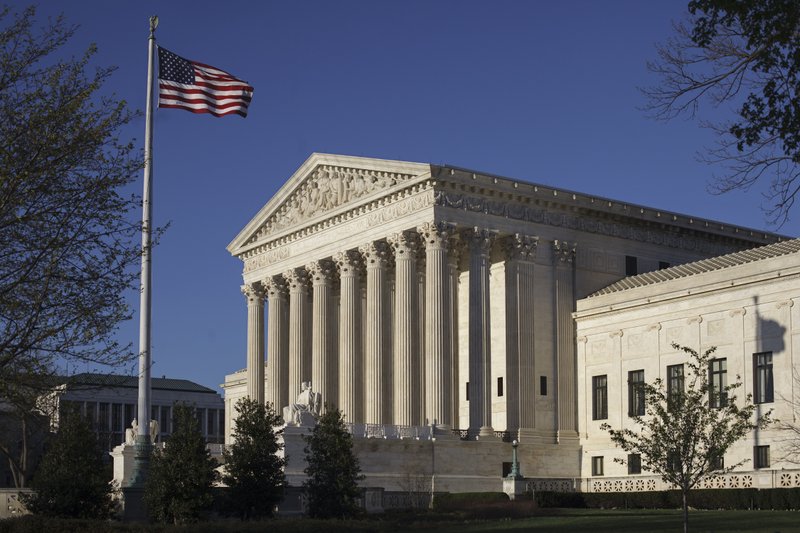
President Donald Trump has interviewed four prospective Supreme Court justices so far. Who are they? Amy Coney Barrett Barrett, 46, was a former law clerk to Justice Antonin Scalia and a longtime Notre Dame Law School professor. At her confirmation hearing last fall to become an appellate court judge, Democrats peppered Barrett on whether her Roman Catholic faith would interfere with her work. Democrats cited a 1998 paper in which she argued that Catholic judges might need to recuse themselves in death penalty cases. Democratic Sen. Dianne Feinstein of California told Barrett that dogma and law are two different things and she was concerned “that the dogma lives loudly within you.” Barrett was eventually confirmed to the U.S. Court of Appeals for the Seventh Circuit in Chicago after telling senators that her views had since broadened. She said it was never permissible for a judge to “follow their personal convictions in the decision of a case, rather than what the law requires.” Brett Kavanaugh Kavanaugh, 53, is a Yale-educated appellate court judge for the District of Columbia who recently wrote a dissent when his colleagues allowed an immigrant teen in U.S. custody to have an abortion. But he’s probably best known for helping independent counsel Kenneth Starr during the impeachment probe of President Bill Clinton and his ties to President George W. Bush. A former clerk to Justice Anthony Kennedy, Kavanaugh worked on behalf of the Bush campaign during the 2000 election recount, later taking a job in the White House counsel office and as staff secretary. When he was confirmed to the federal appeals court in D.C. in 2006, Bush took the unusual step of hosting a Rose Garden swearing-in ceremony with 120 guests to celebrate. At the time, Democrats panned Kavanaugh as a political operative who was being elevated to the court to provide a rubber stamp for Bush’s executive actions. Raymond Kethledge Kethledge, 51, is a former Kennedy law clerk and appeals court judge who graduated from the University of Michigan and its law school. He serves as a judge on the U.S. Court of Appeals for the 6th Circuit in Cincinnati, Ohio. He co-authored a book with Army veteran Michael Erwin of The Positivity Project published last year called “Lead Yourself First: Inspiring Leadership Through Solitude” in which he describes himself as an introvert. In an interview with the legal news site “Above the Law,” Kethledge said “I love to write” and prefers working from his barn office in northern Michigan overlooking Lake Huron without an internet connection. He said he found it “distracting” to his work in 2016 when he found himself on Trump’s short list of nominees to replace Scalia, a job that eventually went to Justice Neil Gorsuch. In the 1990s, Kethledge was counsel to Republican Sen. Spencer Abraham of Michigan, who became Bush’s energy secretary. Kethledge eventually founded a boutique litigation firm with two partners in Troy, Michigan. He was nominated to the 6th Circuit Court of Appeals in 2006 and confirmed in 2008. Amul Thapar Thapar, 49, is a federal appeals court judge from Kentucky who is close to Senate Majority Leader Mitch McConnell. He was Trump’s first judicial nomination to a district or appeals court, and on Trump’s short list to replace Scalia last year, losing out to Gorsuch. In one of his more interesting court cases, Thapar in 2014 as a district court judge in Kentucky sentenced an elderly nun to almost three years in prison for breaking into a U.S. storehouse for bomb-grade uranium and splashing blood on the walls of the bunker. She argued she was acting as a follower of Jesus Christ; Thapar said that provided no excuse for breaching the Y-12 National Security Complex in Oak Ridge, Tennessee. (An appeals court later threw out the sabotage charge, leaving the lesser charge of injuring government property and releasing her from prison early.) An alumnus of Boston College and the University of California, Berkeley, law school, Thapar was nominated by Trump to the 6th Circuit Court of Appeals. Republished with the permission of the Associated Press.


